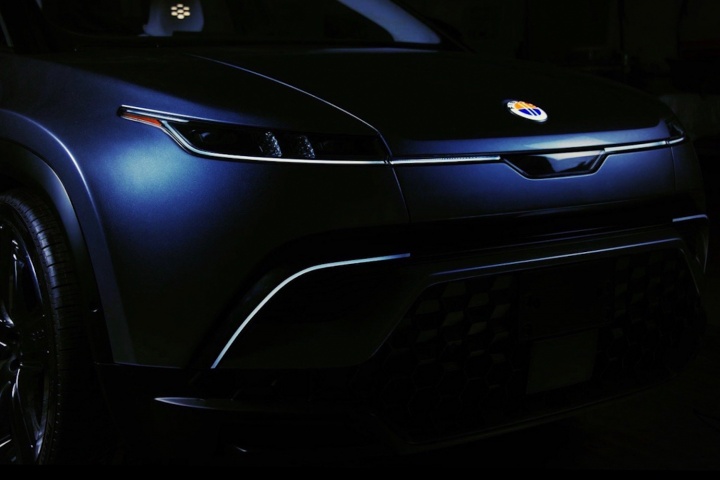Henrik Fisker, the former Aston Martin designer, has revealed more details of his own-brand Ocean SUV at the Consumer Electronics Show (CES) in Las Vegas.
Just $29,999 for a quasi-luxury electric SUV
The new all-electric Ocean will retail at a temptingly low price point for a car from the man who used to scribble Astons. Just USD$37,499 will nab you one, and that's before the tax credits allowable for an electric car are applied. Do that and the price tag drops to USD$29,999. Those with the craving to do so can place a reservation, for a deposit of USD$250, through the Fisker app available from the usual locations.
Or, you could lease one - put down a deposit of USD$2,999 and for USD$379 a month you can drive one away (or at least you can when deliveries start in 2021). The leases are flexible, so you can keep your Ocean for one month, eight months, 22 months or several years, with a mileage limit of 30,000 miles per year.
Now, while there will be those who equate the claim of the greenest SUV with being the tallest mountain in Kildare, Fisker does say that his new electric car incorporates both energy-saving, low-carbon production methods, and uses a lot of recycled material.
'Maximum usability with an unprecedented driving experience'
"For the past two years, we have been working quietly on an emotionally appealing and affordable luxury electric vehicle that will serve as a flagship for driving positive global change - from the most sustainable materials possible across the supply chain to practicality that will change the perception of what an EV can be," Fisker said. "The Fisker Ocean features dramatic sculpture - with a wide stance and a luxurious SUV silhouette. I wanted to combine maximum usability with an unprecedented driving experience. The interior is spacious and extremely modern, bringing a luxury feel and timelessness that has never been seen in a vehicle before. The future of mobility is about enjoying an electric vehicle without hassle, long-term commitment and the prohibitive high cost of ownership. Driving the Fisker Ocean will be easy: through a flexible lease via a mobile app. And we take care of all the service and maintenance. Simply put, we're introducing the future of hassle-free, fun and easy e-mobility."
The car's design incorporates several weight-saving features, including the lack of a bonnet. All that's under the front end is some electronics and the air conditioning system, so Fisker has been able to save weight (and production costs, too) by not having a bonnet, nor the associated hinges and latches.
The Ocean also has a full-length solar roof panel, which Fisker claims (depending on the weather in your area) can provide enough charge for an extra 1,600km of essentially free electric motoring per year. It's part of a unique experience called "California Mode." This feature, inspired by the Fisker brand's roots and passion for the Southern California coastline, lowers/slides nine glass windows/panels to open the entire cabin with one touch - creating an open-air feeling, while still maintaining a full "roll cage" safety structure around the passengers.
Recycled interior fabrics
Inside, the carpets are made from 100 per cent recycled nylon, recovered from discarded fishing nets pulled from the world's seas. The cabin's interior surfaces are made from a vegan-friendly polycarbonate, and all of the plastics used have low production emissions of nasty chemicals such as formaldehyde.
The seat trim is Dinamica, a man-made suede which Fisker says is made from polyester fibres recovered from old t-shirts, and recycles plastic bottles, and which has 80 per cent lower CO2 emissions during its production process than conventional petrochemical based polyester. "Eco-sustainability, as well as the lowest levels of polluting emissions and energy consumption, are guaranteed throughout the whole production cycle" said Fisker in a statement.
On more mundane matters, the Ocean will be capable of a claimed 500km one-charge range from its 80kWh battery pack. Production is due to begin at the end of 2021, with first deliveries due by early 2022.
Fisker, has seen his fair share of automotive industry turmoil since leaving Aston Martin. He resigned from his first independent autonomous car company (which made and designed the plug-in hybrid Karma saloon), before branching out into yacht design, penning the bodywork for the Dodge Viper-based VLF-1 supercar, and even designing his own range of t-shirts and bathrobes. That diversification has some analysts worried about Fisker's ability to deliver a proper, finished car, especially against increasing competition from mainstream car makers, and the likes of Tesla, in the burgeoning electric SUV market. Speaking to the Los Angeles Times, Tim Urquhart, the principal automotive analyst at IHS Markit said: "His past problems mean there's a huge lack of momentum and credibility in the industry, in terms of what he can deliver on. He's already said he's going to build a new sports car, now he's turning around and saying the SUV will be first."









